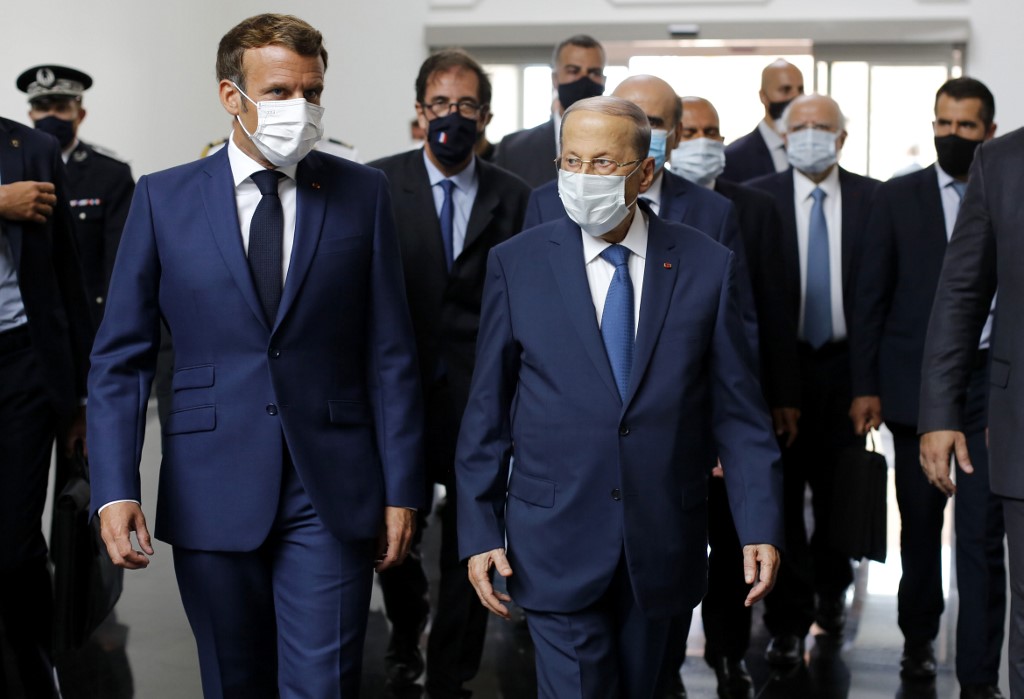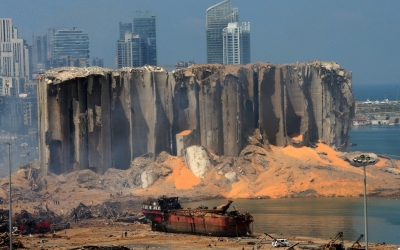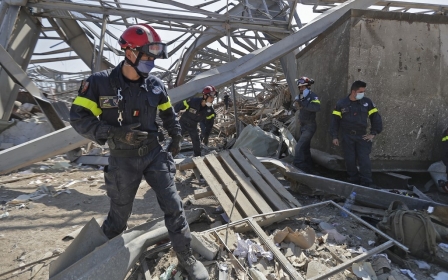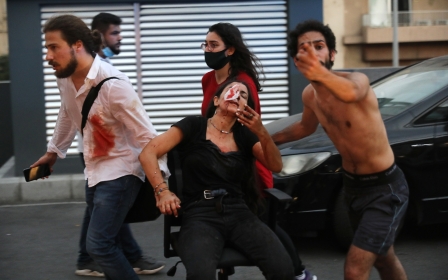What does the return of France and Macron mean for Lebanon?
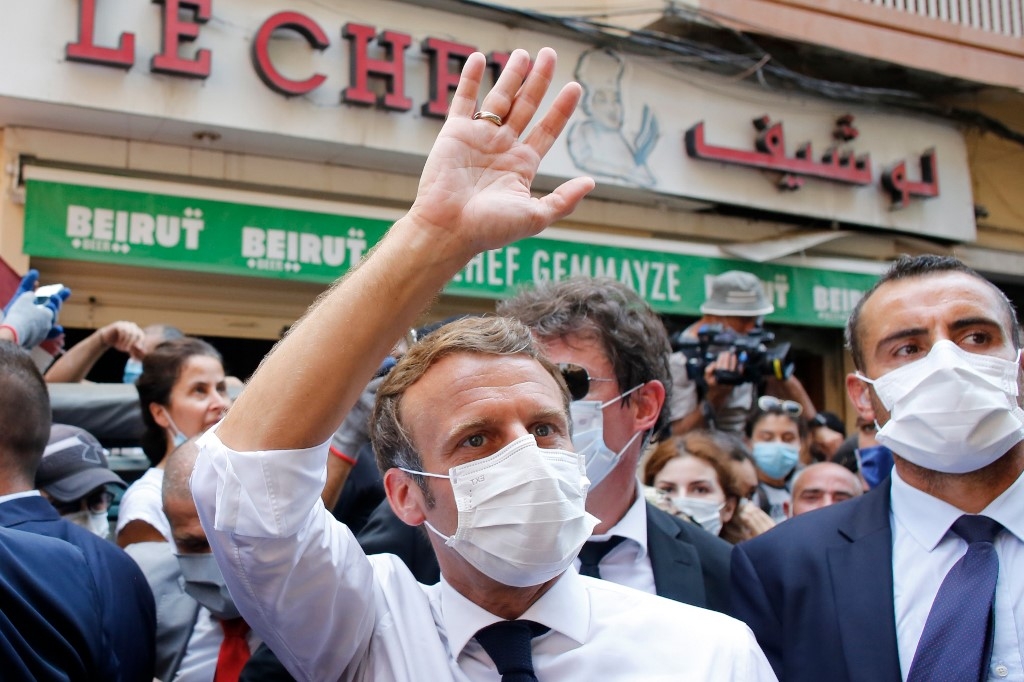
Before the 1975-1990 civil war, Lebanon was known as “the Switzerland of the East”. Today, it is an utterly bankrupt country and a failed state with a paralysed polity.
Why this crisis? Besides the severe mismanagement of the economy through what has been called a “state-sponsored pyramid, or Ponzi, scheme” run by the central bank, one key cause is the corruption of the ruling elites.
More deeply, the very nature of Lebanon’s post-civil war confessional political regime, which aimed to restore peace and democracy to the country, is often identified as the main root of its problems.
Sectarianism and volatility
Instead of creating the foundations for true pluralism and democracy, Lebanon’s highly specific political system has resulted in sectarianism, division, radical political volatility and systemic corruption through institutionalised patronage networks, by which each confessional leader aggressively protects the perceived interests of their specific community, while also hijacking the whole system for personal enrichment.
New MEE newsletter: Jerusalem Dispatch
Sign up to get the latest insights and analysis on Israel-Palestine, alongside Turkey Unpacked and other MEE newsletters
The images of French President Emmanuel Macron visiting Beirut less than 48 hours after the 4 August explosion that destroyed the port and much of the city contrasted sharply with the absence of the country’s own political leaders, who were nowhere to be seen in the ravaged streets and neighbourhoods, for obvious reasons.
Macron promised that aid would be sent directly to the people, not to the government - another clear show of distrust for the nation's authorities
Beyond the stunning rapidity of Macron’s visit, especially in such circumstances, its diplomatic nature was highly unusual. Not only did a foreign leader seem to assume control of the reconstruction, both physical and political, and take it upon himself to fill the power vacuum of a sovereign nation, but he apparently came on his own initiative, without a formal invitation from Lebanese authorities.
He also declared during his walkabouts that he was “not here to help them. I’m here to help you” - an obvious show of contempt for the Lebanese government. He promised that aid would be sent directly to the people, not to the government - another clear show of distrust for the nation’s authorities.
Demanding political reforms
According to Lebanese observers, Macron summoned the ruling triumvirate of President Michel Aoun, a Christian, Prime Minister Hassan Diab (who has since resigned), a Sunni, and Shia parliament speaker Nabih Berri for a meeting at the presidential palace, where he demanded “real political reforms and strong initiatives against corruption, for transparency, and against the opacity of the banking system”.
Macron's rhetoric went much further than that, with the French leader declaring that a “new political order” was needed and that he wanted to propose a “new political pact” among Lebanese authorities, France and the international community.
This new deal might be summed up by saying that without reform, there will be no money and no help. It could thus mark the end of France’s unconditional support for successive Lebanese governments.
International support for Lebanon’s political class seems to have become unsustainable. Macron declared to the people: “I will be back on the first of September, and if [your leaders] can’t do it, I will keep my responsibility to you.” It sounded like a threat to Lebanon’s rulers.
Macron has clearly broken the mould of conventional diplomacy, acting in ways some may find at best paternalistic, and which others might deem neocolonialist - as if Lebanon was a banana republic still under the French mandate, as it was until 1943.
Spectacular diplomatic operation
Macron could afford to engage in such massive political interference in Lebanon’s internal affairs because he knew that what he did, said and promised was backed by many Lebanese people themselves, who welcomed him as a hero, even a saviour.
In a very real sense, Macron thus carried the unheard voices of the ravaged population, now in a state of complete disarray, to its own uncaring leaders. There were many reasons for this spectacular diplomatic operation.
Firstly, given the deep and longstanding bond between France and Lebanon, it would have been unthinkable for the French president to just sit and watch, without doing anything tangible. Beyond their strong bilateral political alliance, a sense of solidarity and friendship permeates the contemporary French and Lebanese civil societies as well.
Secondly, in addition to the 22,000 French-Lebanese who live in Lebanon, France counts a quarter of a million French-Lebanese citizens on its soil, a truly active diaspora.
Thirdly, Lebanon is a pillar of the Francophone world and a key institutional element of France’s international cultural prestige and “soft power”, despite the fact that France and the French language have in the past few decades lost much of their influence there. The Beirut explosion gave Macron a superb opportunity to try to restore some of that influence.
France's 'Arab policy'
From a historical perspective, this visit was inscribed within a long French tradition of spectacular, highly publicised, diplomatic presidential gestures, in the vein of former Socialist President Francois Mitterrand’s June 1992 surprise visit to Sarajevo, or France’s resolute opposition to the Iraq War in 2003.
It thus fits not only with France’s postwar Gaullist “Arab policy”, which was largely abandoned by conservative President Nicolas Sarkozy and which Macron may be resuming as many have urged him to do, but also with France’s need to display “grandeur” and assert itself on the world stage as a major power that intervenes decisively on the side of “good and right”.
With or without Macron, the one and only force that may bring about a truly new political order remains the Lebanese street and civil society at large
Finally, Macron is seeing in Lebanon’s current situation a real risk of total political collapse and societal breakdown that must urgently be addressed for the sake of regional stability.
It remains to be seen whether the reconstruction of Beirut will be limited to the physical urban environment, or whether it will indeed bring about, under pressure from the Lebanese people, Macron and the international community, a “new political order.”
Unfortunately, the old foreign policy atavism of “order and stability first” may prevail. After all, all French presidents, Macron included, have not only helped to establish Lebanon’s failed political regime, but also consistently bailed out its corrupt political class. They are thus partly responsible for the current crisis.
With or without Macron, the one and only force that may bring about a truly new political order remains the Lebanese street and civil society at large.
The views expressed in this article belong to the author and do not necessarily reflect the editorial policy of Middle East Eye.
Middle East Eye delivers independent and unrivalled coverage and analysis of the Middle East, North Africa and beyond. To learn more about republishing this content and the associated fees, please fill out this form. More about MEE can be found here.



